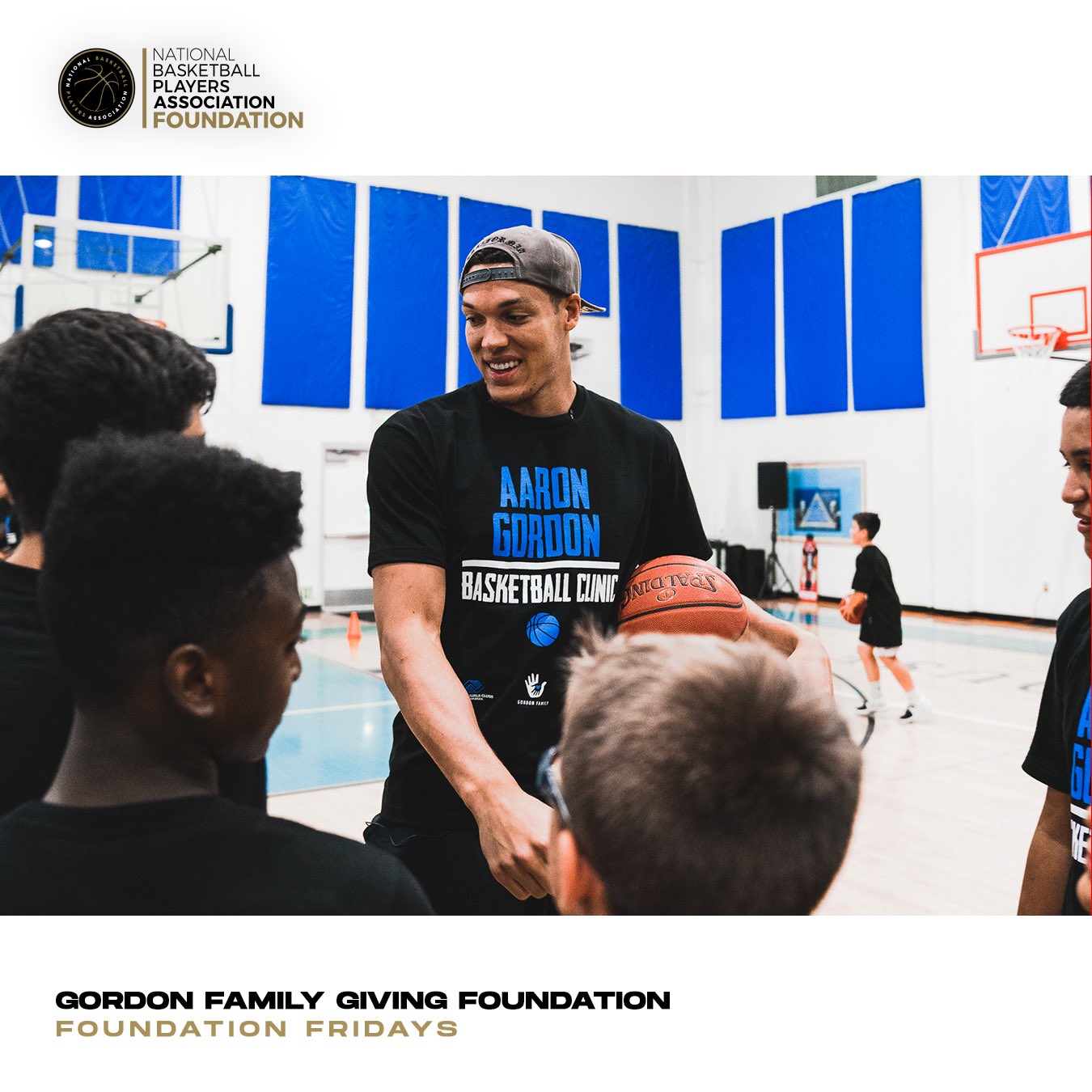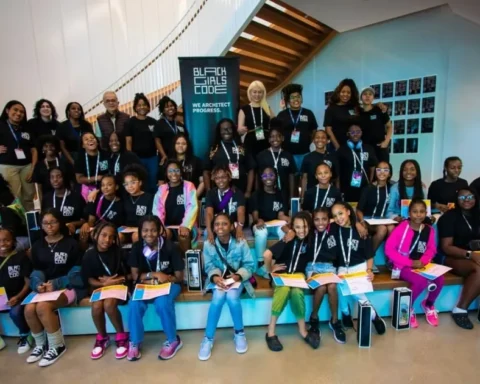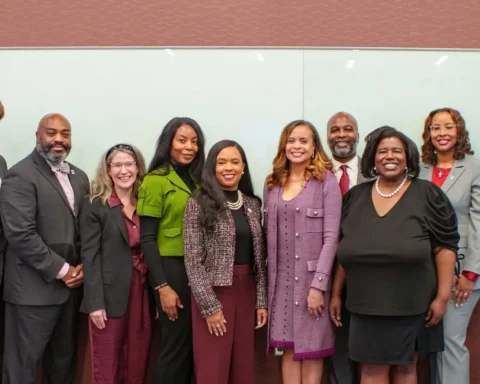By Mark J. Spears
Aaron Gordon noticed that he rarely saw anyone that looked like him or even his mother when he would visit her tech job in Silicon Valley as a kid. And that visual — re: reality — led the Denver Nuggets forward and his mother to start a program with their family foundation in hopes of inspiring underprivileged kids of color to enter the tech world.
“I was probably 10 years old, and what I noticed later, as I reflect, it was all white men,” Gordon, whose mother is white and father is Black, recently told The Undefeated. “She was one of the only women there. She was breaking a glass ceiling of her own. But it was just all white men. That’s not right.”
Gordon was playing for the Orlando Magic in 2018 when he and his family founded the Gordon Family Giving Foundation, whose mission is “to provide opportunity through science, technology, engineering and math education to underserved and underrepresented young students.”
Gordon and his mother, Shelly Davis Gordon, decided in 2019 to use her expertise from 35 years of working as a computer scientist and engineer in Silicon Valley to start CodeOrlando, an immersive STEM experience. The free four-week summer camp for eighth through 12th graders introduced the students from various Orlando, Florida, schools to coding, robotics and nanotechnology. The students are primarily of color from underserved backgrounds, the groups most underrepresented in science, technology, engineering and math fields. Over the years, the kids in the program have taken part in group projects, three-day internships and visited local colleges, tech development companies and organizations. The Gordon Family Giving Foundation partnered with the University of Central Florida’s College of Community Innovation and Education to host the CodeOrlando program on the UCF Downtown campus each summer through 2025.
Said Gordon: “We’re just trying to show these kids there’s a different pathway than fiddling with microphones [in music] and dribbling basketballs, or dealing drugs and gangbanging. There’s other ways to break the generational curse.”
Davis Gordon has a bachelor’s degree from San Diego State in computer information systems and a master’s degree from the University of San Diego in marketing. She began her tech career in Silicon Valley as a product marketing engineer in 1982. She worked for Intel as a product marketing engineer; at LSI Logic as a product and customer marketing manager; at Xilinx Inc., most notably a senior manager in engineering programs; Altera as a senior product marketing manager; and returned to Intel as a partner and marketing solutions director.
Being a woman in a white male-dominated industry from the 1980s to the 2000s was very challenging for Davis Gordon. Being the mother of three biracial kids also made her very aware of the lack of diversity, and she often sat on several diversity and inclusion boards.
“I was the first female in product marketing at my company and after I was there, they did hire more,” Davis Gordon said. “There were very few people who were Black and Hispanic and very few women. There was always the idea that we would have liked to hire more, but the pipeline was very small. And then the ability of the company to really understand who they were hiring and the equity piece of it was very difficult. So, oftentimes, even if you did hire people, they didn’t last long because it wasn’t a superinviting, fun environment for people.
“Many of the women that I started with when we were younger just didn’t stay in the industry. So, by the time I was in my early 50s, I was one of just a few women of that age group still in my company.”
When asked if she dealt with sexism in the tech industry, Davis Gordon said there were incidents daily that were “ingrained in the culture.”
“When I looked back on it, you put up with it because it was just what you did,” Davis Gordon said. “Back in the day, there was nobody in HR that would have even batted an eye at it. When I look back on it, some of the stuff that I went through was this heinous, was just horrifying, but when you’re in the middle of it, you just suck it up and keep going because that’s what you do and you don’t have any recourse.”
Said Gordon: “She used to come home livid sometimes because she was overqualified, more qualified than the white man that got the promotion over her just because she was a woman and he was a man.”
Statistics in recent years in the tech industry have also inspired Gordon and his mother. Of nearly 50,000 employees at Google in 2014, 83% were men, 60% were white and 30% were Asian, while 2.9% were Latino and 1.9% Black, according to the Los Angeles Times. Only 6.5% of all STEM college graduates in 2016 were Black, according to the National Center for Education Statistics. The People of Color in Tech Report released in 2020 stated of its 1,207 respondents, 16% were Black, 16% Asian, 12% Hispanic, 5% Indigenous and 7% other, such as mixed-race.
Gordon said graduates of his program are not only working in the tech industry, but have come back to aid current CodeOrlando participants. Davis Gordon retired from working in Silicon Valley in September 2015 and took over as CEO of the Gordon Family Giving Foundation. She now works with CodeOrlando mentoring and keeping in touch with the current and past participants.
“If you just don’t have anybody in your community that is in that world, you never see that world. It’s that old adage, ‘If you can’t see it, you can’t be it. If you can see it, you can be it.’ And I think that’s really true. So, we wanted to do something where we introduced kids to technology,” Davis Gordon said.
Gordon certainly comes from a basketball family, as his father Ed played at San Diego State, sister Elise played at Harvard and brother Drew is a former NBA player now playing in Ukraine. But thanks to his mother, the eight-year NBA veteran is also a self-described “computer dork” who loves having all the latest tech products and is educated about the newest products.
“She would bring the computers home for us and we would take them apart and look through the whole computer, look through all the chips and everything that made the computer work,” Gordon said. “I didn’t even have the patience to put it back together. I was just wanting to take part in the destruction part of it, but we always were around some of the latest technology in Silicon Valley.
“We were around projectors. We were around augmented reality glasses for video games. We were test children for a lot of the latest technology coming out.”
With CodeOrlando thriving, Gordon plans on beginning a new code program soon in Denver, where he is now thriving with the Nuggets.
Gordon averaged 12.9 points, 6.4 rebounds and 2.5 assists in seven seasons with the Magic before being traded to the Nuggets on March 25. The 6-foot-8, 235-pound forward said that he was trying too hard just to fit in offensively with Denver after the trade, but he also made a strong impact defensively. The Nuggets saw enough of his value after the trade to sign him to a four-year, $92 million contract during the offseason.
“We liked his versatility and his defense,” Nuggets general manager Calvin Booth told The Undefeated. “Obviously, we lost Jerami Grant. We were looking for somebody who is bigger on the wing to help protect Mike [Porter]. Obviously, [Gordon] was playing a No. 1, No. 2 role in Orlando. We felt that he would be a good complementary piece for us.
“I think he had to grow from last season, but what has happened is that we had a whole summer to get him healthy, work on his game more and tighten some things up. I think he’s feeling better about his body and his skill set.”
The Nuggets are still without star point guard Jamal Murray, who is rehabilitating from a torn left ACL and has no timetable for his return. Murray’s absence certainly has put stronger importance on Gordon to contribute offensively. Gordon has averaged 13 points and 7.3 rebounds in 30.3 minutes per game through the first four contests. He is optimistic that Murray will return later this season and believes the Nuggets are a title contender either way with three-time NBA All-Star Nikola Jokić leading the charge.
“We going to be dangerous either way,” Gordon said. “We’re going to get Jamal late this year or maybe next year, but with all the players we have on the team, we are still deep. We still have guards that can score and defend. Obviously, there’s no replacement for Jamal. Jamal, he’s Jamal. He’s one of the best in the league.
“I do a little bit of everything. I’m there to be as glue, make sure everything is running smoothly, to make sure everybody is happy, guard the best player every night and just do me.”
Gordon is most well-known for being one of the NBA’s greatest dunkers. His often-debated dunk contest loss to Zach LaVine in 2016 in Toronto is considered one of the greatest because it included six straight perfect scores. So, will Gordon take part in the 2022 NBA dunk contest in Cleveland and perhaps add a creative STEM twist?
“I will do the dunk contest again, but it’s got to be a grip [financially],” Gordon said. “I’m not sure what the price is, but it’s going to be a lot. It’s going to be entertaining. It’s gonna be a draw. I still got it. People still want me to be in the dunk contest. I know whatever they’re going to pay me they are going to make triple, quadruple that anyway. They can afford it.”



